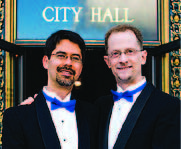 In previous columns, we have delineated the clear distinction between Donald Trump and Hillary Clinton when it comes to LGBT rights, including their vastly different positions on marriage equality, transgender people’s access to public facilities, and judicial appointments. Trump’s selection of the notoriously anti-LGBT Mike Pence as his running mate underscores these differences.
In previous columns, we have delineated the clear distinction between Donald Trump and Hillary Clinton when it comes to LGBT rights, including their vastly different positions on marriage equality, transgender people’s access to public facilities, and judicial appointments. Trump’s selection of the notoriously anti-LGBT Mike Pence as his running mate underscores these differences.
The Orlando massacre has elevated the issue of ending gun violence to its rightful place as an LGBT priority. The issue merits our community’s urgent attention, not just because of the threats and brutality that LGBT people face, but also because millions of Americans, particularly racial minorities and economically disadvantaged people—both LGBT and non-LGBT—live with threats of gun violence on a daily basis.
Like other LGBT issues, the difference between Donald Trump and Hillary Clinton on gun violence is stark. For starters, the National Rifle Association strongly supports Trump and will be spending millions to try to defeat Hillary Clinton. In accepting the NRA’s endorsement, Trump proclaimed: “The NRA has led the fight time and time again to protect our fundamental freedoms. This is an amazing group … these are incredible people.”
Trump apparently wants to see the vast majority of the population armed—either openly or in a concealed manner—so that if people perceive others as a threat, they can open fire. In response to the Orlando tragedy, Trump repeated one of his favorite themes: “It’s too bad that some of the young people that were killed over the weekend didn’t have guns … attached to their hips … where bullets could have flown in the opposite direction… .” Trump seems to think that when people go out to dance, drink, and have a good time—or presumably out to work, to eat, to a little league game, to church, to the beach, or nearly anywhere else—they should be armed. Who knows how many shootouts would erupt in a Trump world. Further, Trump opposes bans on assault weapons that have caused so many deaths in mass shootings, claiming that such firearms are somehow needed for “protection.”
As a United States Senator, Hillary Clinton co-sponsored legislation to extend and reinstate the assault weapons ban. She has pledged that as President she would “start the very first day and tackle the gun lobby to try to reduce the outrageous number of people who are dying from gun violence in our country.” She has explained: “More than 33,000 Americans are killed by guns each year. It’s time to act. As President, I’ll take on the gun lobby and fight for commonsense reforms to keep guns away from terrorists, domestic abusers, and other violent criminals—including comprehensive background checks and closing loopholes that allow guns to fall into the wrong hands.” She told families of victims of Sandy Hook that she would “use every single minute of every day, if I’m fortunate to be your president, looking for ways to save lives so we can change the gun culture.”
The distinction between Trump and Clinton is also crystal clear when it comes to the Supreme Court and gun control. Trump promises that, if President, he would appoint Justices who not only oppose marriage equality but also gun control. Trump, whose favorite Justice is Clarence Thomas, declared that the difference between his and Clinton’s picks for the Court would “be day and night.” Justice Ruth Bader Ginsberg in her much publicized interview in the New York Times agreed, stating that she couldn’t “’imagine what the country would be with Donald Trump as our president…. For the country, it could be four years. For the court, it could be—I don’t even want to contemplate that.’”
The composition of the Supreme Court has, and will have, a critical impact on efforts to alleviate gun violence. The Court’s role is particularly important because eight years ago the Court in District of Columbia v. Heller created an individual constitutional right to possess a firearm at least under some circumstances when it struck down Washington D.C.’s attempt to regulate handguns. The decision was 5–4 and authored by now deceased Justice Antonin Scalia, whose replacement will be determined by the outcome of the election.
Hillary Clinton has stated that the Heller decision was “wrongly decided,” although we don’t know the full extent to which she disagrees with the decision. In her New York Times interview, Justice Ginsburg remarked that she “thought Heller was a very bad decision” and observed that the Court could have an opportunity to reconsider it when the Court next hears a challenge to a gun control measure.
In endorsing Trump, the NRA warned its members about Clinton getting the “opportunity to replace Antonin Scalia with an anti-gun Supreme Court justice” and observed “[t]he stakes in this year’s presidential election could not be higher… .” Indeed, they couldn’t be.
John Lewis and Stuart Gaffney, together for over three decades, were plaintiffs in the California case for equal marriage rights decided by the California Supreme Court in 2008. Their leadership in the nationwide grassroots organization Marriage Equality USA contributed in 2015 to making same-sex marriage legal nationwide.
Recent Comments